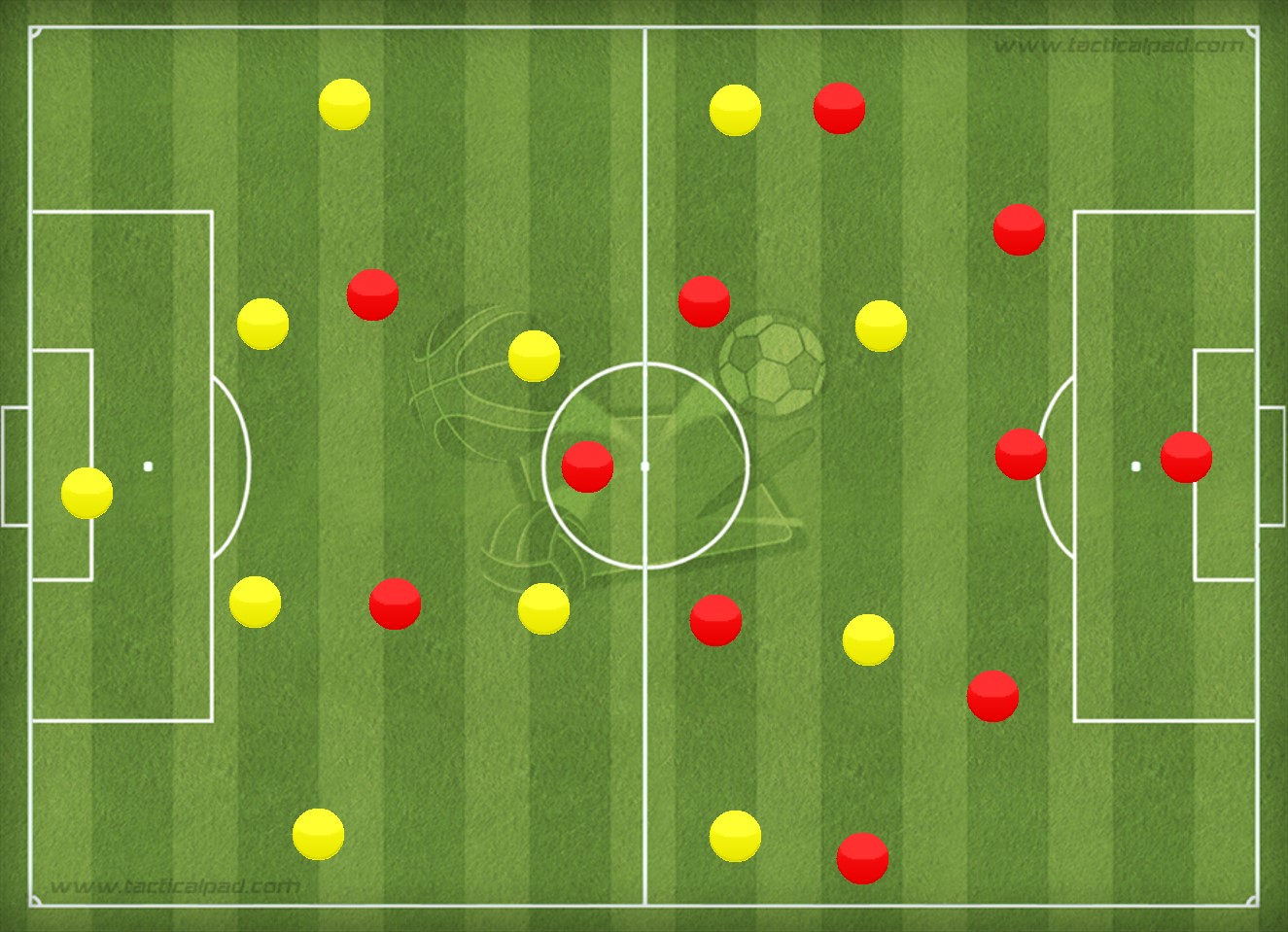Oliver McManus writes about five high performing managers across Europe who have flown under the radar and highlights their achievements.
Following on from Richard Pike’s article on the 5 Under-the-Radar managerial changes ahead of the 2016/17 season, Oliver McManus take a look at 5, in general, underrated managers from the European leagues.
You’ll notice that there is a common connection between them; that being that, all but one, have never played football at a professional level and yet still are able to achieve some of the game’s highest honours.

Hein Vanhaezebrouck
We’ll kick off our little foray into the world of under-rated managers in the Belgian Pro League and the manager of KAA Gent, Hein Vanhaezebrouck.
Born in 1964, the 52 year old has taken charge of 5 different clubs in his 13 year managerial career and joined his current club, Gent, in May of 2014 after stabilising the fortunes of home-town club K.V. Kortrijk.
A popular figure in Belgium, after the failure of the national team at Euro 2016, he was widely tipped to be the man to replace Marc Wilmots at the helm.
Considered one of the greatest tacticians in Europe, potentially the world, he puts substance and results over the style of play and, very often, it pays dividends. Known for being meticulously detailed, he is equally varied with his use of formations and game plans – often specifically created for each opponent.
Having made his name at Kortjik in two spells totalling nearly a decade of work, he had brief, failed, spell at Genk during 2009 but, he learnt his lessons and, when his next big job came a calling, he was prepared for the increased scrutiny.
He led Gent to their first ever national title, at the very first time of asking, in 2014/15 and – the season after – guided De Buffalo’s to the round of 16 in the Champions League, having achieved victories over Lyon, Zenit and Valencia.
Big things await both Gent and Vanhaezebrouck, the key question is, for how long will they remain together?
Julian Nagelsmann
Appointed by 1899 Hoffenheim on the 10th February 2016, Julian Nagelsmann became the youngest in the history of the Bundesliga – aged just 28.
You could be forgiven for thinking that, the former Augsburg youth player, Nagelsmann, lacked a certain experience that many would deem a prerequisite for managing an elite club, such as Hoffeinheim. But, you would be wrong.
He actually comes to the club with 8 years of coaching experience – of which 6 have been in and around the youth systems of his current employers.
A promising young centre back, Nagelsmann was forced to retire at the tender age of 20 after a recurring knee injury. He abandoned football completely, for a while, studying Business Administration and, then, Sports Science at university.
The current Dortmund manager, Thomas Tuchel, brought him into the coaching setup of Augsburg, as ‘youth assistant’, before joining 1860 Munich for 2 years – until the summer of 2010.
It is at that point where he would join Hoffenheim as the assistant manager of their Under-17 team and, until taking over the main job, worked in a variety of youth positions – including guiding Hoffeinheim’s junior team to the 2014 youth league title.
Nicknamed ‘Mini-Mourinho’ by Tim Wiese, little is REALLY known of the man from the tiny southwestern town Landsberg am Lech, but hope is high and, if you ask me, Julian Nagelsman is the man to watch this season, having made an instant impact during his short tenure as Hoffenheim boss.
Bob Bradley
Moving on to the most experienced coach on this list – the 58 year old – Bob Bradley, who has had 13 coaching roles since taking charge of inter-collegiate team Ohio Bobcats in 1981.
Born in New Jersey, he had a 4 year youth career at the football team of the prestigious Princeton University – before turning his attentions to coaching. He spent 11 years in charge of the very same team (from 1984 to 1995) before his first big break came as assistant manager of the United States Under-23 team.
Impressive were his displays, and he adventured into Major League Soccer in time for the 1998 season in charge of the Chicago Fire making, yet another, instant impact and guiding the club to a league and cup double in the first year.
After having built a powerful domestic CV in America, he was entrusted with the fate of the national team – quickly implementing his own brand of football whilst integrating a host of young players into the squad.
During his time in charge of the USMNT, he led them to 4 finals of major competitions – even managing to win the 2007 CONCACAF Gold Cup – and helped make the likes of Taylor Twellman and Landon Donovan become household names in the United Kingdom!
A scintillating stint with the Egyptian national team lead to Norwegian top flight team Stabaek placing their faith in him – which he repaid (with interest), guiding them to a top-three finish and a spot in the Europa League.
If you ask me, he is currently faced with his biggest challenge in guiding Ligue 2 club, Le Havre, up to the top division after a period of sustained mediocrity in its current state; keep an out for them in the current season because, under Bradley’s control, anything could happen.
Mark Sampson
At 33 years of age, you could be forgiven for thinking that Sampson would be the youngest manager on this list yet, remarkably, he isn’t – as we’ve already read about the adventures of Julian Nagelsmann.
What is even more remarkable is the sheer scale of achievements during his 8 year coaching career; culminating in a 3rd place finish in the 2015 FIFA Women’s World Cup.
After a short-lived amateur career with the Cardiff Corinthians, Sampson studied at the University of Wales Institute, completing a degree in Sports Development. Shortly after, at the age of 21 he was employed by the Welsh Football Association before, in turn, becoming a coach at Wales’ two biggest clubs – Cardiff City and Swansea City.
Come 2008 and he would be appointed to his first managerial role, heading up Taff’s Well, in the Welsh 2nd division – within a year, he was appointed boss of Bristol Academy in the FA Women’s Premier League; a transition into women’s football that would prove to be his best career decision to date.
Four years at the helm of the Bristolian’s would see Sampson transform the club from the nomads of the Women’s game – veritable underachievers – to a comparative powerhouse in the ever developing game of women’s football.
2 FA Women’s Cup finals, in 2010-11 and 2012-13, saw them run the most-successful English club in women’s football – Arsenal – close on both occasions. The 2013 FA WSL season would see them achieve their highest ever finish, second place.
It was in December of that very same year that Sampson was appointed with the ULTIMATE responsibility in taking charge of the England women’s team; replacing Hope Powell after 15 years of, frankly, mediocrity.
Two years of rebuilding took place before, in 2015, Sampson and the Lionesses took the world by storm. In March, they won the Cyprus Cup beating teams such as Canada, Mexico and Italy to the title.
3 months later and the World Cup beckoned, an intense group stage with victories over Colombia and Mexico saw them progress to the knockout stages; Norway awaited in the round of 16, where a third successive 2-1 victory ensured they went through to the quarter-finals.
Home favourites Canada were next up – and, yet, again, another 2-1 win guaranteed their progress in the tournament. A devastating last-minute own goal by defender Laura Bassett saw the team crash out, but their biggest moment was still to come – a victory against Germany in the third place play off would see the 2015 Lionesses go down as the most successful England football team in 49 years and, with that, Mark Sampson a place in eternal football history.
Eusebio di Francesco
Eusebio di Francesco, the only man with professional playing experience to grace our Top 5, but what a career he had; 577 appearances for 7 different Italian club, capped 12 times by the national team and winner of the 2000-01 Serie A with Roma.
After 3 managerial stints with, respectively, Virtus Lanciano, Pescara, Lecce, di Francesco was given the task of guiding Sassuolo to Serie A status for their first time in history – in June of 2012.
In his previous jobs, it would be fair to say, little promise was shown but he discovered a new found freedom and resurgence at the Neroverdi – much like the other coaches featured, cultivating a successful team based on a mix of experience and talented youth.
A shrewd manager, he arrived with the club in a good position, but struggling for goals – promotion in his first season saw a marked improvement on this front, with both goals scored and goal difference improving by 50%.
Serie A awaited the men in black and green and although they initially struggled with the imperious pressure, a star was born in their first season,
A star by the name of Domenico Berardi, a star who was given his debut by di Francesco in a 3-0 win over Cesena. The scorer of 16 goals in just 29 games, Berardi was just a glimpse of the talent with which Sassuolo were able to produce under the regime of di Francesco.
Although sacked in 2014, for all of 3 months, he was brought back in as manager after results for the club hit a rock bottom.
And, boy, are the club grateful for bringing him back; a sixth place finish in the 2015-16 Serie A secured European football for what is fast becoming the people’s club of Italy and, if di Francesco can work his magic for one season more, then the time may come to fly the cuckoo’s nest and take on a job at one of the bigger European clubs.
- Syria: The path to World Cup qualification - July 8, 2020
- The story of South Africa’s topsy-turvy footballing journey - November 8, 2017
- Interview: Sunil Chhetri on his foreign stints, Bengaluru FC, and the rise of Indian football - October 24, 2017
























































